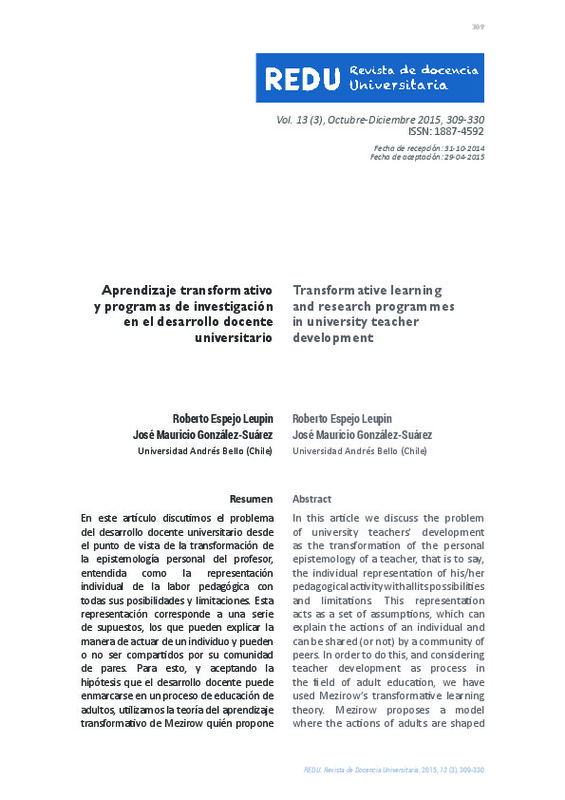Bain, K. (2004). What the best college teachers do. Cambridge: Harvard University Press.
Barr, R., Tagg, J. (1995). From teaching to learning: a new paradigm for undergraduate education. Change,27(6), 13-25.
Blanchard-Laville, C. y Fablet, D. (Eds.). (2000). L'analyse des pratiques professionnelles. Paris: L'Harmattan.
[+]
Bain, K. (2004). What the best college teachers do. Cambridge: Harvard University Press.
Barr, R., Tagg, J. (1995). From teaching to learning: a new paradigm for undergraduate education. Change,27(6), 13-25.
Blanchard-Laville, C. y Fablet, D. (Eds.). (2000). L'analyse des pratiques professionnelles. Paris: L'Harmattan.
Boyer, E. (1990). Scholarship reconsidered: priorities of the professoriate. San Francisco: Jossey-Bass.
Brookfield, S. (1995). Becoming a critically reflective teacher. San Francisco: Jossey-Bass.
Bunge, M. (1980). Epistemología. México D.F.: Siglo XXI.
Chalmers, A. (1982). ¿Qué es esa cosa llamada ciencia? Madrid: Siglo XXI.
Cranton, P. (1996). Professional development as transformative learning. San Francisco: Jossey-Bass.
De Ketele, J. M. (2010). La pédagogie universitaire: un courant en plein développement. Revue française de pédagogie, 172, 5-13.
Dilthey, W. (1948). Introducción a las ciencias del espíritu. Buenos Aires: Espasa-Calpe.
Endrizzi, L. (2011). Savoir enseigner dans le supérieur: un enjeu d'excellence pédagogique. Dossier d'actualité veille et analyses, 64.
Evans, L. (2002). What is teacher development? Oxford Review of Education, 28(1), 123-136.
Ferrater Mora, J. (1965). Diccionario de filosofía. Buenos Aires: Sudamericana.
Foucault, M. (1969). L'archéologie du savoir. Gallimard: Paris.
Gargallo, B., Fernandez, A., Jimenez, M. A. (2007). Modelos docentes de los profesores universitarios. Teoría de la educación, 19, 167-189.
Gibbs, G. y Coffey, M. (2004). The impact of training of university teachers on their teaching skills, their approach to teaching and the approach to learning of their students. Active learning in higher education, 5(1), 87-100.
Hempel, C. (1965).Aspects of scientific explanation and other essays in the philosophy of science. New York: Free Press.
King, K. (2004). Both sides now: examining transformative learning and professional development of educators. Innovative higher education, 29(2), 155- 174.
Kuhn, T. (1971). La estructura de las revoluciones científicas. Mexico: FCE.
Kuhn, T. (1977). The essential tension. Chicago: The university of Chicago press.
Lakatos, I. (1970). Falsification and the methodology of scientific research programmes. En Lakatos, I., Musgrave, A. (1970). Criticism and the growth of knowledge. Cambridge: Cambridge University Press.
Mezirow, J. (1991). Transformative dimensions of adult learning. San Francisco: Jossey-Bass. Moliner, P. y Guimelli, C. (2015). Les représentations sociales. Grenoble: PUG.
Postareff, L., Lindblom-Ylänne, S. and Nevgi, A. (2007). The effect of pedagogical training on teaching in higher education. Teaching and teacher education, 23, 557-571.
Whitehead, A. N. (1929). The aims of education and other essays.New York: Macmillan Company.
Whitelaw, C., Sears, M. y Campbell, K. (2004). Transformative learning in a faculty professional development context. Journal of Transformative Learning, 2(9), 9-26.
Windelband, W. (1980). Rectorial address, Strassbourg, 1894. History and theory, 19(2), 169-185.
[-]








